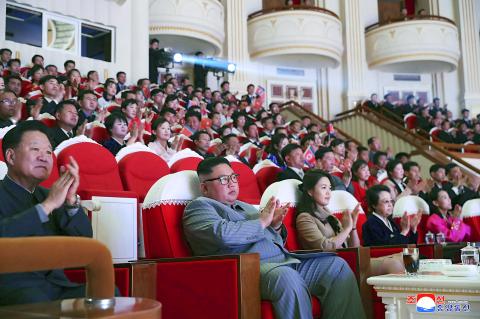North Korean leader Kim Jongpun’s aunt made her first public appearance in about six years, state media reported yesterday, quelling rumors that she was purged or executed by her nephew after helping him inherit power from his father.
According to a Korean Central News Agency (KCNA) dispatch, the name of Kim Kyong-hui was included in a list of top North Korean officials who watched a performance marking Lunar New Year’s Day with Kim Jong-un at a Pyongyang theater on Saturday.
North Korea’s main newspaper also released a photo showing Kim Kyong-hui sitting near Kim Jong-un and his wife, Ri Sol-ju, at the Samjiyon Theater.

Photo: Korean Central News Agency via AP
Kim Kyong-hui, 73, was once an influential figure in North Korea as the only sister of late North Korean leader Kim Jong-il, the father of Kim Jong-un.
She had initially kept a low profile during the early part of her brother’s rule, but she later frequently accompanied him on his inspection trips after he suffered a stroke in 2008.
While taking up many top posts, such as a four-star army general and a member of the powerful Politburo, she was also believed to have played a key role in grooming Kim Jong-un as the next leader.
Kim Jong-un eventually took power after his father died of a heart attack in late 2011.
Kim Kyong-hui’s fate had been in doubt after Kim Jong-un had her husband and then-North Korea’s No. 2 official, Jang Song-thaek, executed for treason and corruption in December 2013.
His death was reported by Pyongyang and remains the most significant in a series of executions or purges that Kim Jong-un has engineered in what outside experts believe were attempts to remove potential rivals and cement his grip on power.
Days after Jang’s execution, Kim Kyong-hui’s name was mentioned in a KCNA dispatch as a member of a funeral committee for another top official. However, she missed a state ceremony commemorating the second anniversary of Kim Jong-il’s death days later.
Her name had since never been mentioned in North Korean state media until yesterday’s report.
Some North Korea monitoring groups in Seoul and foreign media outlets had speculated that Kim Jong-un had his aunt executed or purged, or she died of health problems.
Outside experts said Kim Kyong-hui had long suffered from liver and heart problems and high blood pressure.
Analyst Cheong Seong-chang at South Korea’s private Sejong Institute said that Kim Kyong-hui’s re-emergence suggested Kim Jong-un was attempting to strengthen the unity of his ruling family as he is pushing to harden his position toward the US in stalled nuclear negotiations.
However, Kim Kyong-hui is unlikely to regain her political influence, as she now has no position in the politburo, which has already been filled with new figures, Cheong said.

Taiwan is gearing up to celebrate the New Year at events across the country, headlined by the annual countdown and Taipei 101 fireworks display at midnight. Many of the events are to be livesteamed online. See below for lineups and links: Taipei Taipei’s New Year’s Party 2026 is to begin at 7pm and run until 1am, with the theme “Sailing to the Future.” South Korean girl group KARA is headlining the concert at Taipei City Hall Plaza, with additional performances by Amber An (安心亞), Nick Chou (周湯豪), hip-hop trio Nine One One (玖壹壹), Bii (畢書盡), girl group Genblue (幻藍小熊) and more. The festivities are to

Auckland rang in 2026 with a downtown fireworks display launched from New Zealand’s tallest structure, Sky Tower, making it the first major city to greet the new year at a celebration dampened by rain, while crowds in Taipei braved the elements to watch Taipei 101’s display. South Pacific countries are the first to bid farewell to 2025. Clocks struck midnight in Auckland, with a population of 1.7 million, 18 hours before the famous ball was to drop in New York’s Times Square. The five-minute display involved 3,500 fireworks launched from the 240m Sky Tower. Smaller community events were canceled across New Zealand’s

AFTERMATH: The Taipei City Government said it received 39 minor incident reports including gas leaks, water leaks and outages, and a damaged traffic signal A magnitude 7.0 earthquake struck off Taiwan’s northeastern coast late on Saturday, producing only two major aftershocks as of yesterday noon, the Central Weather Administration (CWA) said. The limited aftershocks contrast with last year’s major earthquake in Hualien County, as Saturday’s earthquake occurred at a greater depth in a subduction zone. Saturday’s earthquake struck at 11:05pm, with its hypocenter about 32.3km east of Yilan County Hall, at a depth of 72.8km. Shaking was felt in 17 administrative regions north of Tainan and in eastern Taiwan, reaching intensity level 4 on Taiwan’s seven-tier seismic scale, the CWA said. In Hualien, the

‘IRRESPONSIBLE’: Beijing’s constant disruption of the ‘status quo’ in the Taiwan Strait has damaged peace, stability and security in the Indo-Pacific region, MOFA said The Presidential Office yesterday condemned China’s launch of another military drill around Taiwan, saying such actions are a “unilateral provocation” that destabilizes regional peace and stability. China should immediately stop the irresponsible and provocative actions, Presidential Office spokeswoman Karen Kuo (郭雅慧) said, after the Chinese People’s Liberation Army (PLA) yesterday announced the start of a new round of joint exercises around Taiwan by the army, navy and air force, which it said were approaching “from different directions.” Code-named “Justice Mission 2025,” the exercises would be conducted in the Taiwan Strait and in areas north, southwest, southeast and east of Taiwan